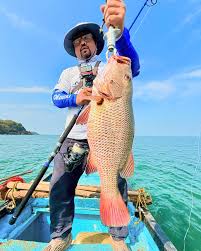Mangrove Jack : The best Guide about Price, Benefits and All.
Do you know anything about the fish Mangrove Jack? This fish is somewhat popular for the anglers because of its taste and fighting abilty. This fish is scientifically referred to as Lutjanus argentimaculatus commonly known as Mangrove Jack is a warm water fish that is well adapted to reside in coastal waters particularly mangrove swamps.

Physical Characteristics
Appearance
The Mangrove Jack has a distinctive look. It is usually reddish-brown with darker fins. Young ones have vertical stripes, but these fade as they grow. Their strong, streamlined bodies are built for speed.
Size
The Mangrove Jacks have an average weight of about 2.3 to 3.4 kg and can reach a size of at most 91 cm. Some have been known to grow even bigger than these, which would make for a marvelous capture!
Habitat and Distribution of Mangrove Jack
Natural Habitat
It prefers to live in the area where mangroves are present and extend to estuaries and coastal reefs. Resident prefer water depth of less than 20 ft but are known to be present up to100 ft depth.
Geographical Distribution
These fish are native to the areas in and around the Indo-Pacific regions of the world. They are usually located along the strip of the Australian coast down to the Malaysian peninsula and over to the topical region of East Africa, India too.
Behavior and Diet: Mangrove Jack
Feeding Habits
As for their feeding habits, Mangrove Jacks are of the opportunistic type. Their diet is small fish, grubs like crabs and prawns and sometimes squares as well. Actually, they are rather sneaky predators, which kills their prey.
Behavior
These fish are known for being territorial and aggressive. They are mostly active at night, hiding in structures like submerged roots and rocks during the day.

Fishing for Mangrove Jack
Best Fishing Techniques
To catch a Mangrove Jack, you need the right gear. Use a medium to heavy rod and reel setup. Strong lines are essential due to their powerful runs. Live bait like prawns and small fish work well, but artificial lures can also be effective.
Fishing Locations
Look for them around mangroves, rocky outcrops, and reefs. They are most active during dawn and dusk. Seasonal changes can affect their location, so local knowledge is valuable.
Tips and Tricks
- Use a stealthy approach; Mangrove Jacks are wary fish.
- Be prepared for a strong fight; they are known for their powerful runs.
- Fish during low-light conditions for the best results.
Culinary Value of Mangrove Jack
Taste and Texture
The meat of the Mangrove Jack is firm and white, with a slightly sweet flavor. It’s often compared to other high-quality fish like snapper.
Cooking Methods
Mangrove Jack is versatile in the kitchen. It can be grilled, baked, fried, or steamed. Popular recipes include grilling with herbs and lemon, or frying with a crispy coating.
Conservation and Management of Mangrove Jack
Conservation Status
Currently, the Mangrove Jack is not considered endangered. However, overfishing and habitat destruction are concerns. It’s important to fish responsibly.
Management Practices
Many regions have regulations to protect Mangrove Jack populations. These include size limits, bag limits, and seasonal closures. Conservation organizations are also working to preserve their habitats.
Interesting Facts
Unique Traits
- Mangrove Jacks can live in both saltwater and freshwater.
- They have strong jaws and sharp teeth, making them formidable predators.
Cultural Significance
In some cultures, the Mangrove Jack is prized not only for its taste but also for its fighting ability, making it a popular sport fish.
Can Mangrove Jack live in Freshwater?
Yes, Mangrove Jack fish are known to survive in both fresh water as well as in sea water. It is for this reason that people believe that they are adaptable to the different conditions of the environment. Although they dwell in many parts of Australia’s coasts and estuaries, juvenile Mangrove Jacks occasionally establish themselves in freshwater river and lake systems.
When grown up, many return to the estuaries and coastal reefs; meanwhile, some can stay in freshwater habitats for probably longer periods. They are such a versatile fish and because of this, it makes it easier for fishermen to locate them anywhere.
How to Catch
Catching a Mangrove Jack can be challenging but rewarding. Here are some tips:
Gear
- Rod and Reel: Use a medium to heavy rod and a strong, reliable reel.
- Line: A 20-30 lb test braided line and a 30-40 lb fluorocarbon leader are recommended.
Baits and Lures
- Live Bait: Prawns, small fish, and crabs work best.
- Dead Bait: Fresh pieces of fish or squid are also effective.
- Lures: Use hard-bodied lures, soft plastics, and topwater lures that mimic small fish and crustaceans.
Locations
- Structures: Look around mangroves, submerged roots, fallen trees, rocky outcrops, and jetties.
- Tidal Influence: Fish during incoming or outgoing tides for better success.
Timing
- Dawn and Dusk: The best times to fish as Mangrove Jacks are most active during low light.
- Night Fishing: They are nocturnal feeders, making night fishing productive.
Techniques
- Casting and Retrieval: Cast near structures and retrieve slowly, varying speed and pauses.
- Anchoring and Drifting: Anchor near promising spots or drift with the current.
Tips
- Stealth: Approach quietly as they are easily spooked.
- Sharp Hooks: Ensure your hooks are sharp and strong.
- Local Knowledge: Consult local anglers for insights.
By using these tips, you can increase your chances of successfully catching a Mangrove Jack. Happy fishing!
Checkout below youtube video
Summary
The Mangrove Jack is an extraordinary fish and an insectivore in the ecosystem, as well as loved by many fishermen. This must be one of the few species that is known for its strength, its concentrated taste, and the versatility for incorporation into different recipes. Just bear in mind that proper management of the Mangrove Jack population is crucial to make sure the next generations could as well fish the Mangrove Jacks. Hence, pack your gear and contribute to the forum by revealing your Mangrove Jack fishing experience.

